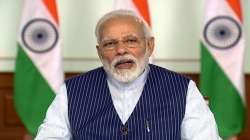PMVVY rate of return reduced to 7.4 pc, scheme extended till Mar 2023
The government on Wednesday fixed the annual rate of return for Pradhan Mantri Vaya Vandana Yojana (PMVVY), a social security scheme for senior citizens, at 7.4 per cent for 2020-21, down from 8 per cent in the previous fiscal, as it extended the scheme by three years.

The government on Wednesday fixed the annual rate of return for Pradhan Mantri Vaya Vandana Yojana (PMVVY), a social security scheme for senior citizens, at 7.4 per cent for 2020-21, down from 8 per cent in the previous fiscal, as it extended the scheme by three years.
The Union Cabinet extended the PMVVY up to March 31, 2023 for a further period of three years beyond March 31, 2020 and also allowed "initially an assured rate of return of 7.40 per cent per annum for the year 2020-21 per annum and thereafter to be reset every year", an official release said.
In Union Budget 2018-19, the government had extend the scheme up to March 2020 with an assured return of 8 per cent, and also doubled the investment limit per senior citizen to Rs 15 lakh.
The release further said the Cabinet also approved an annual reset of assured rate of interest with effect from April 1 of financial year, in line with revised rate of returns of Senior Citizens Saving Scheme (SCSS) up to a ceiling of 7.75 per cent, with fresh appraisal of the scheme on breach of this threshold at any point.
The income security scheme for senior citizens is implemented through the Life Insurance Corporation (LIC).
It intends to give an assured minimum pension to senior citizens (60 years and above) based on an assured return on the purchase price/subscription amount.
As per the release, the government's financial liability is limited to the extent of the difference between the market return generated by LIC and the guaranteed return of 7.4 per cent per annum initially for the year 2020-21, and thereafter to be reset every year in line with SCSS.
The expenses on managing the scheme are capped at 0.5 per cent of assets under management per annum for the first year of the scheme, and 0.3 per cent per annum second year onwards for the next nine years.
"As such the expected financial liability will range from an estimated expenditure of Rs 829 crore in the financial year 2023-24 to Rs 264 crore in last FY 2032-33," the release said.
The average expected financial liability for subsidy reimbursement, calculated for annuity payment on actual basis, is expected to be Rs 614 crore per year for currency of the scheme, it added.
The actual interest-gap (subsidy) would however depend upon the actual experience in terms of number of new policies issued, the quantum of investment made by subscribers, actual returns generated and the basis of annuity payment, the release said.
The scheme was announced in Union Budget of 2017-18 and 2018-19.
Pension is payable at the end of each period during the policy term of 10 years, as per monthly, quarterly, half-yearly, yearly frequency, as chosen by the pensioner at the time of purchase.